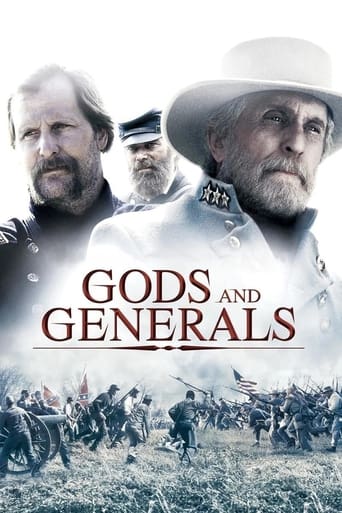gregeichelberger
Originally published on Feb. 14, 2003This Robert F. Maxwell-directed Civil War epic is the second of a trilogy (after 1993's "Gettysburg," while "Last Full Measure" is scheduled to conclude) chronicling this country's most devastating conflict. And, while a bit over long (at 3 and-a-half hours) as well as a bit preachy in parts - and it could have been titled "The Stonewall Jackson Story," the picture is often engrossing and powerful. The battle scenes, which accurately depicted the insane tactic of marching directly into enemy rifle and cannon fire unblinkingly, are some of the best this scribble has witnessed. Movie begins with the Confederates firing on the Federal Fort Sumter in 1861 and depicts U.S. Army Col. Robert E. Lee (Robert Duval, Oscar winner for "Tender Mercies") turning down command of the Northern Army of the Potomac. He later becomes the leader of the Army of Northern Virginia. There are three main battles featured here: the first battle of Manasas (called Bull Run by Northern writers, July, 1861), Fredericksburg (December 1862) and Chancellorsville (May, 1863), all Confederate victories utilizing Lee's tactical brilliance as well as the invaluable assistance of his most trusted and able cavalry general, Jackson (played wonderfully by Stephan Lang, Gen. George Pickett in "Gettysburg," but best known as Ike Clanton in "Tombstone"). Lee realized that a long war of attrition would favor the North, which could call upon a population of approximately 20 million, as well as a huge industrial advantage. The South had just six million people, including three million slaves whom they would never arm. He also understood the art of maneuvering his troops and diving his forces to his advantage. And, much like Napoleon, scored victories while tremendously outnumbered. Quick and decisive wins were needed to throw the industrial Union into a panic and make the citizens less hungry for war while attracting possible aid from European nations. Jackson understood these tactics, as well, and used them to brutal effectiveness. He was fearless, too, earning his nickname at Manasas, standing like a stone wall before his retreating men and rallying them to victory. Both he and Lee attended West Point (when CSA Pres. Jefferson Dave was James Buchanan's Secretary of War) and learned strategy not only from Napoleon, but Wellington and Frederick the Great, among other brilliant military leaders. During the first two years of the war, the generalship and élan of the South scored triumph after triumph in the Eastern Campaign, while Federal leaders such as Gen. George B. McClellan and other lesser known men (such as Ambrose Burnside and George Meade, among others) just sat on their hands - much to Pres. Abraham Lincoln's ire. Jackson, as portrayed by Lang, was a complex and nuanced man of religious piety who abhorred the institution of slavery yet fought for the cause to sustain it. His relationships with his men, his wife and the daughter of a friend, Jane Corbin (Lydia Jordan, "Third Watch" TV series) betray a sensitive individual who seems woefully out of place in this great conflagration. His tactics, however, were second to none and who knows what his death (at the hands of his own troops shortly before Gettysburg) mortally hurt the Confederate cause.
SnoopyStyle
In 1861, Robert E. Lee (Robert Duvall) rejects the offer to lead the Union Army. Then he accepts to lead the Army of Virginia. At the start of the war, Thomas "Stonewall" Jackson (Stephen Lang) is a diligent instructor at Virginia Military Institute in Lexington. He would become the legendary Confederate general who leads his army from one victory to the next. Joshua Lawrence Chamberlain (Jeff Daniels) was a teacher who becomes Lieutenant Colonel in the 20th Maine leading his men in the most decisive skirmish in the most decisive battle. The movie follows mostly Jackson until his death. Everybody has stuffy lines as if they're reading period letters. Nobody is acting loose. It's a series of cardboard characters acting from one scene to the next. The dialog is unapologetically pompous and unflinching. I'd rather watch a documentary like 'The Civil War'. One would expect to dig a little deeper into the characters but we only get the stoic surfaces of these men. This does follow mostly the lesser done southern cause which is fascinating by itself. Of course, slavery is white-washed a bit with only master-loving house slaves. I just wish these characters are more flesh and blood.As for the action, it is very impressive with the reenactors and period equipment. There are certainly a lot extras. The wide shots look great but the close up action could be better done. It needs an expert action director and Ronald F. Maxwell is not the one. This movie is an exercise in recreating the history book but there is little in terms of dramatic cinema.
culmo80
I'm a huge Civil War buff and I really enjoyed Gods and General...the novel.Unfortunately, the film was just a rambling mess that tried to introduce too many characters and tell too much of a complicated war. This film tried to be a drama, a biopic, and a war film among other things. Had they just focused on Stonewall Jackson, the film may have worked, but instead, they tried to follow the pattern of Gettysburg by telling as many sides as possible. Trying to tell three years of history proved to be too much. The result was that much of the history was left untold and too many of the characters were given too little screen time to adequately unwrap them.We don't ever see the important battles that occurred on the Peninsula, 2nd Manassas, or Antietam. The portrayals of many of the important figures is well-done. Robert Duvall is a big improvement over Martin Sheen, Stephen Lang does a good job as Stonewall...but the performances aren't enough to make the film worthwhile. However, the dialog was very archaic and grandiose; there are long monologues where a character will pray or talk at length about something. I get that this is to impart the deep religious convictions, but its overdone and it become tedious.I suppose you could watch the 5-hour director's cut...if you really want to sit on the couch for five hours.
galahad58-1
Gods and Generals does not have the impact that Gettysburg had for viewers and historical enthusiasts. Gods and Generals is a long, boring movie that takes too much time trying to show sympathy to the southern army rather than tell the complete story. The consistent bible pounding, preaching, "thou art" dialog that Stephan Lang spouts takes a lot out of the movie. There could have been one scene where the film showed his devotion to his religion, rather than take every chance to preach to the audience. Face it--it is hypocritical to even try since these folks were abusing slaves, selling men and women, and treating other human beings as cattle. You can talk the talk, but the south never walked the walk of a Christian. To try and show that the southerners were Christians in the eyes of the Christian god is ridiculous. Secondly to have Jackson portrayed as this good fellow who has free slaves who follow him in pure devotion was beyond ridiculous. Jackson was the same as all slave owners. Even by any remote chance he did not beat his slaves, he still had them living in poor conditions, he still owned and traded human flesh and he was as guilty as every other southern gentlemen who fought to keep people in bondage. Any film that tackles the slavery issue and tries to bring sympathy for the southern devil isn't worth the film it is printed upon. More should have been spent on the battles and the slavery issue should have been avoided unless you wanted to portray it correctly.




